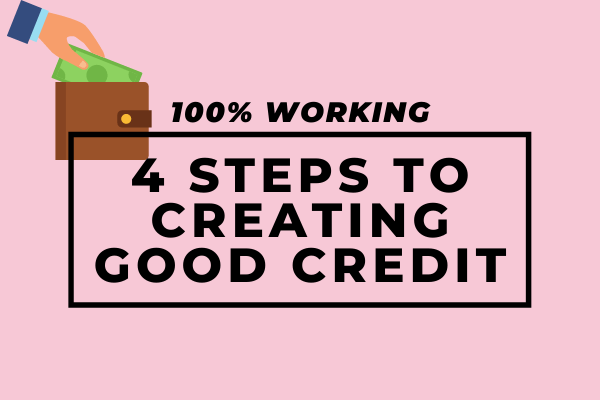4 Steps to Creating Good Credit
Establishing good credit habits and therefore a good credit rating will improve your credit worthiness. This will be reflected in potential lenders offering you substantially lower interest rates and better deals on credit offers. Next we are going to tell you 4 Steps to Creating Good Credit.
establishing a good credit rating with your lenders. Whether you are shopping for a new home or auto, or searching for the best deals on insurance, your credit worthiness will be judged by your credit rating or credit score.A bad credit history or bad credit habits will place “black marks” on your credit profile. These include things such as late payments, having an account assigned to a collection agency, and of course bankruptcy.Establishing good credit habits and therefore a good credit rating will improve your credit worthiness. This will be reflected in potential lenders offering you substantially lower interest rates and better deals on credit offers. Here are 4 steps to help you in creating a shining and good credit profile:
1) Pay Your Bills On Time
2) Don’t Use Too Many or Too Few Credit Cards
How much is too much ? How little is too little ? Many credit experts and financial planners suggest two to four credit cards is just the right mix.
3) Pay At Least The Minimum Due
Always pay at least the minimum due payment, but never less. And remember, just paying the minimum payment means it will take you years and years to pay off that credit card.
Example: Paying off a $2,000 credit payment at 18% APR with a minimum monthly payment of 2% ($40 dollars or less) will take you 30 years to pay off the amount plus interest.
4) Review Your Credit Report Regularly
Monitor your credit report from all three major credit bureaus – Experian, TransUnion, and Equifax – on a regular basis. Check your credit profile at least annually. Review it carefully and make sure that any past mistakes or disputes have been corrected.
Also, if you notice an account listed that you know that you have not personally opened, contact that creditor and the credit bureaus immediately. This could be a sign that you’ve had your identity stolen. Request to have a fraud alert placed on your profile and account to protect yourself and your credit. Identity theft is the fastest growing consumer crime in America, with an estimated 1 million people victimized each year.
Establish good credit habits early in life and reap the benefits that your good credit rating will provide you for the rest of your financial future.



